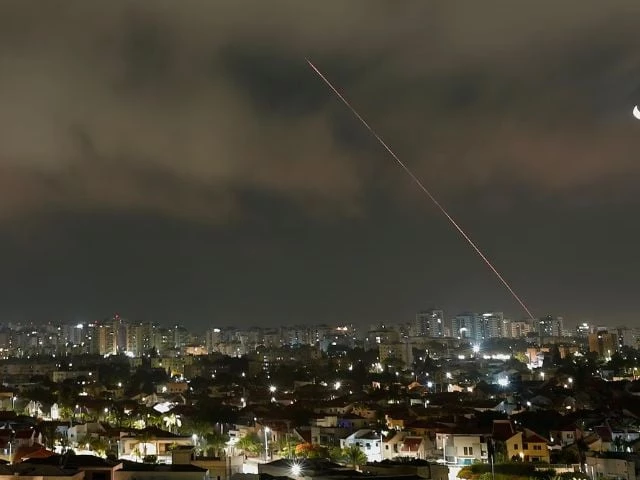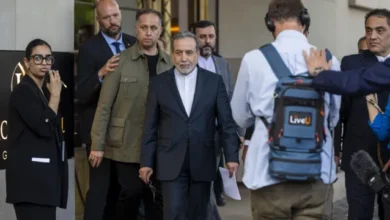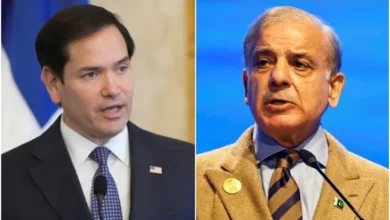The Israeli-initiated conflict with Iran continued to escalate early Saturday, with both sides exchanging fresh strikes, even as diplomatic efforts in Geneva stalled with no breakthrough on a ceasefire.
An Iranian missile triggered a fire in a residential building in central Israel, prompting evacuations and emergency response, though no casualties were reported.
The fire, believed to be caused by debris from an intercepted missile, came amid ongoing aerial exchanges. Sirens rang out across central and southern Israel as five ballistic missiles were fired from Iran, according to Israeli officials, with no immediate damage or injuries reported aside from the Holon fire.
Iran’s missile strikes were in retaliation to Israeli air assaults targeting Iran’s nuclear infrastructure. Sirens were heard across southern Israel as the emergency service reported that five ballistic missiles had been fired. No immediate damage or casualties were reported from the missile launches.
The residents evacuated the building. So far, no physical injuries have been found. MDA teams are providing medical care on site to several individuals suffering from anxiety and are continuing to search for additional casualties.
— Magen David Adom (@Mdais) June 21, 2025
The escalation follows an intense week of aerial warfare, with Israel targeting military and nuclear sites in Iran. The Israeli Defense Forces (IDF) have confirmed they had targetted numerous Iranian missile systems and radar installations as part of its strategy to curb Tehran’s nuclear ambitions, which Israel and its allies claim are aimed at producing nuclear weapons—an assertion Tehran denies.
✈️ The IAF continues its mission to maintain aerial superiority in Iranian airspace.
Fighter jets struck several Iranian missile systems and radar installations in the areas of Isfahan and Tehran, which were intended to target IDF aircraft and disrupt their operations.
This… pic.twitter.com/bbo9njUgDC
— Israel Defense Forces (@IDF) June 20, 2025
The latest missile attack on Israel, which ignited a fire in Holon near Tel Aviv, is part of Iran’s ongoing retaliation. Interceptions over Tel Aviv were visible in the skies, with explosions reverberating across the city as Israel’s air defence systems engaged the incoming threats.
Israeli defense minister says military killed head of IRGC Palestine Corps
Israel’s Defence Minister Israel Katz announced on Saturday that the military killed Saeed Izadi, a veteran commander leading the Palestine Corps of Iran’s Quds Force, in a strike on an apartment in Qom, Iran. The IRGC has not confirmed the report.
The Quds Force, known for building the Axis of Resistance network including Hezbollah and Hamas, has faced significant setbacks amid Israeli offensives since Hamas’ October 7, 2023 attacks.
In Geneva, Iranian Foreign Minister Abbas Araghchi met with European leaders to address the ongoing conflict. The talks, however, yielded little progress, with Araghchi reaffirming that Iran would not engage in negotiations until Israel ceases its military actions. He expressed concern over Europe’s failure to condemn Israeli strikes, suggesting that Tehran would only return to diplomatic talks once “aggression stops.”
The standoff intensified as US President Donald Trump warned of potential military escalation and set a two-week deadline to decide on possible US involvement.
Meanwhile, Israel’s military chief Eyal Zamir acknowledged the possibility of a prolonged campaign. “The campaign is not over,” he said, pointing to the difficulty ahead despite significant achievements in Israel’s air campaign.
Hundreds of US citizens have fled Iran in recent days, as tensions mount and the US government works to assist its citizens. However, the evacuation process has been marred by delays and reports of harassment. The US State Department has not provided further details on the situation.
Iran FM in Turkey for OIC meeting on Israeli aggression
Iranian Foreign Minister Abbas Araghchi arrived in Istanbul on Saturday to attend the 51st session of the Organisation of Islamic Cooperation (OIC) Council of Foreign Ministers.
The two-day summit is expected to focus on recent Israeli strikes on Iranian territory, which Tehran calls “unprovoked aggression.” Araghchi said the attacks forced Iran to respond in self-defence.
While the conflict rages on, diplomatic efforts continue, with world leaders urging both sides to de-escalate.
However, with ongoing missile exchanges and rising casualties—639 deaths reported in Iran by a Washington-based human rights organisations and 24 in Israel—the path to peace remains uncertain.
Israel’s ambassador to the UN, Danny Danon, has pledged continued military action until Iran’s nuclear threat is neutralised, further complicating prospects for a ceasefire. Iranian officials have called for Security Council intervention, while Russia and China have urged a diplomatic resolution.
US intelligence community divided
The US intelligence community, for its part, remains divided over the status of Iran’s nuclear capabilities. Despite public statements, some reports suggest it would take Iran up to three years to build a nuclear warhead.
The dishonest media is intentionally taking my testimony out of context and spreading fake news as a way to manufacture division. America has intelligence that Iran is at the point that it can produce a nuclear weapon within weeks to months, if they decide to finalize the… pic.twitter.com/mYxjpJY2ud
— DNI Tulsi Gabbard (@DNIGabbard) June 20, 2025
Many critics have argued the nuclear weapons pretext mirrors the flawed intelligence that led to the Iraq war, raising fears of history repeating itself.
The Iraq war, launched on false claims of weapons of mass destruction, unleashed decades of bloodshed and regional instability that still haunt the region today.
Similar to the Iraq war, other US-led regime change campaigns in Syria and Libya have sparked widespread violence, fueled the rise of terrorism, caused the loss of hundreds of thousands of lives, and left deep-rooted instability that continues to impact the region.
As the situation continues to escalate, Turkish President Recep Tayyip Erdogan warned of a “point of no return,” while Russian and Chinese leaders called for a ceasefire and a return to diplomacy.
The conflict has reached unprecedented levels following Israel’s “Operation Rising Lion” and Iran’s retaliatory “Operation True Promise,” which has resulted in widespread casualties and damage. The UN Secretary-General, Antonio Guterres, has called on all parties to “give peace a chance.”







